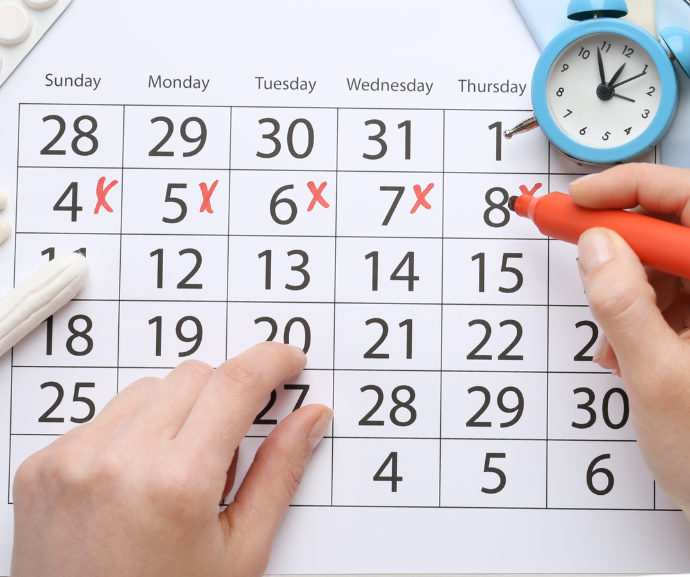- Schools and students across UK sign up to new menstrual literacy teen course announced in Parliament
-
New survey reveals 6 in 10 UK teens don’t know when to seek medical help for problem periods, and 76% of teens say their mental health is negatively impacted by their menstrual health
-
Young person featured in the course calls menstrual illiteracy and shame a “a national disgrace”
The ‘Menstrual Cycle Support for Teens’ course, which aims to transform stigma and shame, empower young people and reverse diagnosis times for endometriosis (average 8 years 10 months), premenstrual dysphoric disorder (PMDD) [12 years], heavy menstrual bleeding and other menstrual health conditions, launches in Parliament on Thursday.
The initiative, a partnership between Menstrual Cycle Support and Endometriosis UK, is free to all schools and teens on social prescription. Eight founding partner schools from across the UK helped shape the course and have signed up to offer it to their students.
Fiona Rowles-Jane, Mental Health & Safeguarding Lead from founding partner school Camborne Science & International Academy, says,
“We are often approached by parents and students asking for support with period pain and other symptoms and we look forward to being able to support them with this much needed new menstrual health service, which we hope will become a key part of our mental health policy.”
The course, by digital menstrual health organisation Menstrual Cycle Support and national charity Endometriosis UK, is clinically backed, peer-reviewed and evidence-informed. It is available through GP surgeries across the UK on social prescription, though anyone can ‘self refer’ and take the course now on the Menstrual Cycle Support website.
The announcement comes as the two organisations release the ‘Teen Menstrual Literacy Survey’, which reveals that 6 in 10 (59%) of British teenagers don’t have enough understanding to know when to seek medical help for menstrual cycle problems.
Megan Coutanche, 21, who features on the free digital course for teens, has a history of her menstrual cycle affecting her physical and mental health. She says,
“The menstrual illiteracy, shame and dismissal of young people in 2024 is a national disgrace.”
The Teen Menstrual Literacy Survey also reveals that:
-
Nearly a 1/3 (30%) didn’t understand what a period was before they had their first one
-
The majority (57%) of young people rated their level of knowledge and understanding of the menstrual cycle as poor (only 15% as strong)
-
45% didn’t receive information and/or support from school or college
-
More than 3 in 4 (76%) say their menstrual cycle had a negative impact on their mental health as teenager
Kate Shepherd Cohen, Founder and CEO of Menstrual Cycle Support, says,
“Young people have the right to understand what is normal when it comes to their bodies. Menstrual literacy improves confidence to chart our cycles, adapt our lives according to the different phases and, crucially, talk about our cycles with clinicians.”
Emma Cox, CEO of Endometriosis UK, says,
“Being ‘too young’ to have endometriosis or menstrual health problems is a myth that must be overcome; without a diagnosis treatment can’t be accessed and diseases may progress. The impact of lost education and academic attainment can have a lifelong impact on career and prospects. As well as impacting on physical health, the psychological effect of being told your pain is not real, or not believed, can be significant. The Menstrual Cycle Support for Teens course will empower future generations, providing the understanding and language they need to effectively seek help.”
Dame Lesley Regan, the Women’s Health Ambassador for England, who is attending the event in the House of Commons, says,
“The Teen Menstrual Literacy Survey reveals a significant lack of knowledge about menstrual health, which is worrying since this must impact negatively on girls being able to get on with their lives. Poor menstrual health is preventable and this new approach is a crucial step towards empowering girls and young women with the information they need to advocate for their own health and wellbeing.”
-
For more on the course and project see the Project Report.
-
According to a new independent Impact Report of the adult version of the Menstrual Cycle Support ‘the menstrual health support course has enabled people to become more aware of their menstrual health cycle, have more confidence to talk about their menstrual health cycle with clinicians, and have more knowledge to chart their cycle and adapt their life according to the different phases.’
-
The Teen Menstrual Literacy Survey was conducted by Censuswide with 2003 females aged 18 to 25yrs old between 15.02.24 to 19.02.24. Censuswide abide by and employ members of the Market Research Society which is based on the ESOMAR principles and are members of The British Polling Council. The survey can be viewed here.
-
The average wait time to get a diagnosis of endometriosis is now 8 years and 10 months - Endometriosis UK’s ‘Dismissed, ignored and belittled’ report.
-
Menstrual Cycle Support is the world’s first menstrual health service available on social prescription: https://menstrualcyclesupport.com/.
-
The average wait for a diagnosis for PMDD is 12 years, according to the IAPMD.


